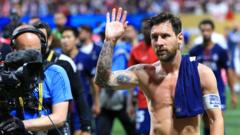The clash arises from Mbappé's claim of financial entitlement from PSG, revealing tensions between a sports icon and a wealthy club owner that reflects broader trends in the global soccer landscape.
Kylian Mbappé Takes Legal Action Against Paris Saint-Germain Over Contract Dispute

Kylian Mbappé Takes Legal Action Against Paris Saint-Germain Over Contract Dispute
A high-stakes legal battle unfolds between soccer superstar Kylian Mbappé and his former club Paris Saint-Germain, igniting intense scrutiny.
With a rich history tied to the Qatari-backed PSG, Kylian Mbappé's recent legal conflict underscores not only personal ambition but also the complex dynamics of modern soccer contracts.
In a dramatic turn of events, Kylian Mbappé, one of the world’s most recognizable soccer players, finds himself embroiled in a legal confrontation with Paris Saint-Germain (PSG), the illustrious club he once represented. The conflict has escalated into a high-stakes battle over millions, as Mbappé accuses the Qatari-owned team of harassment and seeks 55 million euros (approximately $61 million) he claims he is owed following his unexpected departure from the club.
Initially, the partnership between Mbappé and PSG appeared to be a match made in soccer heaven. Brought to PSG in 2017 from AS Monaco for a staggering fee of around $200 million, Mbappé rapidly became the focal point of the club's ambitions. His explosive talent helped the team secure numerous accolades, solidifying his status as a global sports icon. However, a longstanding desire to play for Real Madrid loomed over his tenure, leading to a precarious situation as his contract neared expiration.
In 2022, after lengthy negotiations, Mbappé opted to remain with PSG, an outcome heavily influenced by French President Emmanuel Macron’s personal intervention. Nevertheless, his stay with the club was short-lived as he departed a year earlier than anticipated, prompting a clash over contractual obligations. PSG contends that there was an unwritten agreement in place for Mbappé to forgo pending payments when he exited the team, a claim that contrasts sharply with the player’s assertion of being wrongfully deprived of his due earnings.
This dispute casts a spotlight on the underlying tensions within the global soccer arena, where player power often faces off against the financial clout of club ownership, particularly in cases involving state-backed entities like Qatar. With PSG emerging as a powerhouse in sports through substantial investments—including hosting the 2022 FIFA World Cup—this legal disagreement reflects a wider narrative of ambition, influence, and the complexities of professional sports contracts.
As the case unfolds, the implications for both Mbappé and PSG are substantial, potentially shaping the landscape for athlete-club relationships well into the future.
In a dramatic turn of events, Kylian Mbappé, one of the world’s most recognizable soccer players, finds himself embroiled in a legal confrontation with Paris Saint-Germain (PSG), the illustrious club he once represented. The conflict has escalated into a high-stakes battle over millions, as Mbappé accuses the Qatari-owned team of harassment and seeks 55 million euros (approximately $61 million) he claims he is owed following his unexpected departure from the club.
Initially, the partnership between Mbappé and PSG appeared to be a match made in soccer heaven. Brought to PSG in 2017 from AS Monaco for a staggering fee of around $200 million, Mbappé rapidly became the focal point of the club's ambitions. His explosive talent helped the team secure numerous accolades, solidifying his status as a global sports icon. However, a longstanding desire to play for Real Madrid loomed over his tenure, leading to a precarious situation as his contract neared expiration.
In 2022, after lengthy negotiations, Mbappé opted to remain with PSG, an outcome heavily influenced by French President Emmanuel Macron’s personal intervention. Nevertheless, his stay with the club was short-lived as he departed a year earlier than anticipated, prompting a clash over contractual obligations. PSG contends that there was an unwritten agreement in place for Mbappé to forgo pending payments when he exited the team, a claim that contrasts sharply with the player’s assertion of being wrongfully deprived of his due earnings.
This dispute casts a spotlight on the underlying tensions within the global soccer arena, where player power often faces off against the financial clout of club ownership, particularly in cases involving state-backed entities like Qatar. With PSG emerging as a powerhouse in sports through substantial investments—including hosting the 2022 FIFA World Cup—this legal disagreement reflects a wider narrative of ambition, influence, and the complexities of professional sports contracts.
As the case unfolds, the implications for both Mbappé and PSG are substantial, potentially shaping the landscape for athlete-club relationships well into the future.





















